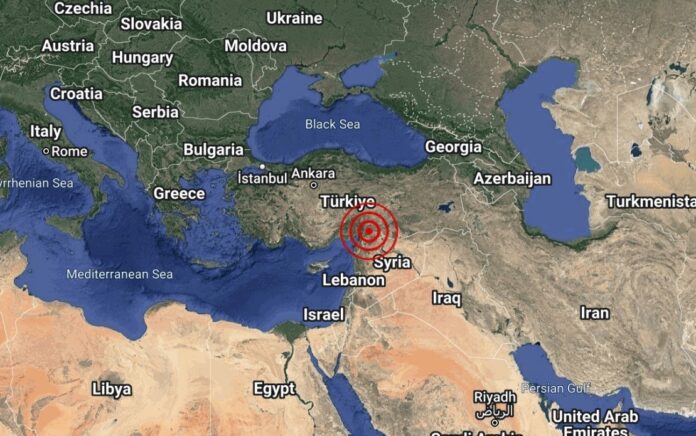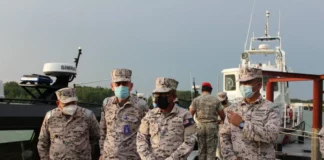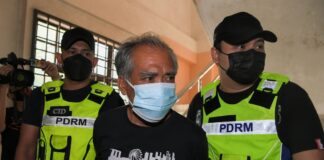ANKARA, Feb 7 — At least 2,921 people were killed and 15,834 others injured in 10 provinces of Türkiye due to two strong earthquakes that jolted the southern part of the country, an official from the nation’s disaster agency said early Tuesday.
Early Monday morning, a powerful magnitude 7.7 earthquake struck Pazarcik district of Kahramanmaras province and strongly shook several other provinces, including Gaziantep, Sanliurfa, Diyarbakir, Adana, Adiyaman, Malatya, Osmaniye, Hatay and Kilis.
Then at 13.24 pm (1024GMT), a 7.6 magnitude quake centred in Kahramanmaras’s Elbistan district struck the region.
Yunus Sezer, head of the Disaster and Emergency Management Presidency (AFAD), said the quakes were followed by 243 aftershocks and 6,217 buildings collapsed reported Anadolu Agency.
Around 16,400 search and rescue personnel are working in the region, Sezer said, adding that 65 countries have offered help so far.
Türkiye’s Vice President Fuat Oktay said that 338,000 earthquake victims have been housed in dormitories, universities, and shelters.
Orhan Tatar, risk reduction general manager of AFAD, said earlier in the day that 250 million Turkish liras (about US$13.3 million) in emergency funds had been sent to the provinces in the disaster area so far.
As a “purely precautionary decision,” the Turkish Petroleum Pipeline Company (BOTAS) stopped the flow of crude oil in the region, Tatar added.
Turkish President Recep Tayyip Erdogan said that with the quake, Türkiye was shaken by the “biggest disaster” since the 1939 Erzincan earthquake.
“Our state has taken action with all its institutions since the earthquake. All resources have been mobilised,” he said at the AFAD office in the capital Ankara, where he was coordinating the rescue and relief work.
Erdogan also called on the nation to be of “one heart,” saying: “I hope we will leave these disastrous days behind in unity and solidarity as a country and nation.”
The president spoke to the mayors of Adana, Osmaniye, Hatay, and Kilis on the phone and was briefed about the search and rescue efforts, according to the presidency.
Türkiye will observe seven days of national mourning after the deadly earthquakes.
“Due to the earthquakes that took place in our country on Feb 6, a national mourning period was declared for seven days. Our flag will be hoisted at half-mast until sunset on Sunday, Feb 12, all over our country and in our foreign representations,” Erdogan said on Twitter.
Earlier Monday, Oktay told a news conference that Erdogan has been following and managing official efforts since the initial quake struck.
He added that Hatay Airport is currently closed to flights, saying they have also closed airports in Kahramanmaras and Gaziantep to civil flights.
Oktay said that 102 mobile base stations have been sent to the earthquake zones so far.
He also called on all media outlets, institutions and organisations to rely on official statements to guard against misinformation.
National Education Minister Mahmut Ozer said education in Türkiye is suspended until next Monday, Feb 13.
Youth and Sports Minister Mehmet Kasapoglu said all national sports events in Türkiye have been suspended until further notice.
The earthquake was also felt in several neighboring countries in the region, including Lebanon and Syria.
Erdogan conveyed get-well wishes to citizens affected by the earthquakes. He added that AFAD and other units are “on alert.”
The president said that rescue teams were immediately dispatched to quake-affected areas.
“Our Interior Ministry and Health Ministry, AFAD, provincial governorships, and all other institutions started their work rapidly.
“We are also coordinating our work after the (initial) earthquake. We hope that we will get through this disaster together as soon as possible and with the least damage, and we continue our work,” he said.
Türkiye issued a level 4 alarm, which includes a call for international aid, AFAD said in a statement.
Following a discussion with the Turkish Foreign Ministry, AFAD also said that international assistance was called for through the Emergency Response Coordination Center (ERCC).
Besides rescue teams, blankets, tents, food, and psychological support teams were also sent to the region.
After the initial earthquake, an “air aid corridor” was created by the Turkish Armed Forces to deliver search and rescue teams to the region.
“We mobilised our planes to send medical teams, search, and rescue teams, and their vehicles to the earthquake zone. We have maximized the readiness of our aircraft to provide the necessary transportation service,” National Defence Minister Hulusi Akar said.
A large number of transport aircraft, including a Turkish Armed Forces A-400M, began to dispatch search and rescue teams and vehicles to the region. Ambulance planes are also using the air aid corridor, Akar added.
“The Turkish Armed Forces continues our efforts to determine damage and casualties. Unfortunately, we have three martyrs. There are also injured,” he said.
He later announced that a naval personnel transport ship would dock at the port of Iskenderun in Hatay later in the night to carry those injured to hospitals in Mersin province, about 140 kilometres (87 miles) west.
Health Minister Fahrettin Koca said an adequate number of teams from all 81 provinces are on duty in disaster areas and continue their search and rescue and health services.
“Our air and land ambulances are also in service in the region. We are currently carrying out the coordination from Hatay, one of the provinces affected by the earthquake disaster,” he said on Twitter.
After the earthquakes, condolences poured in from around the world expressing solidarity with Türkiye.
















